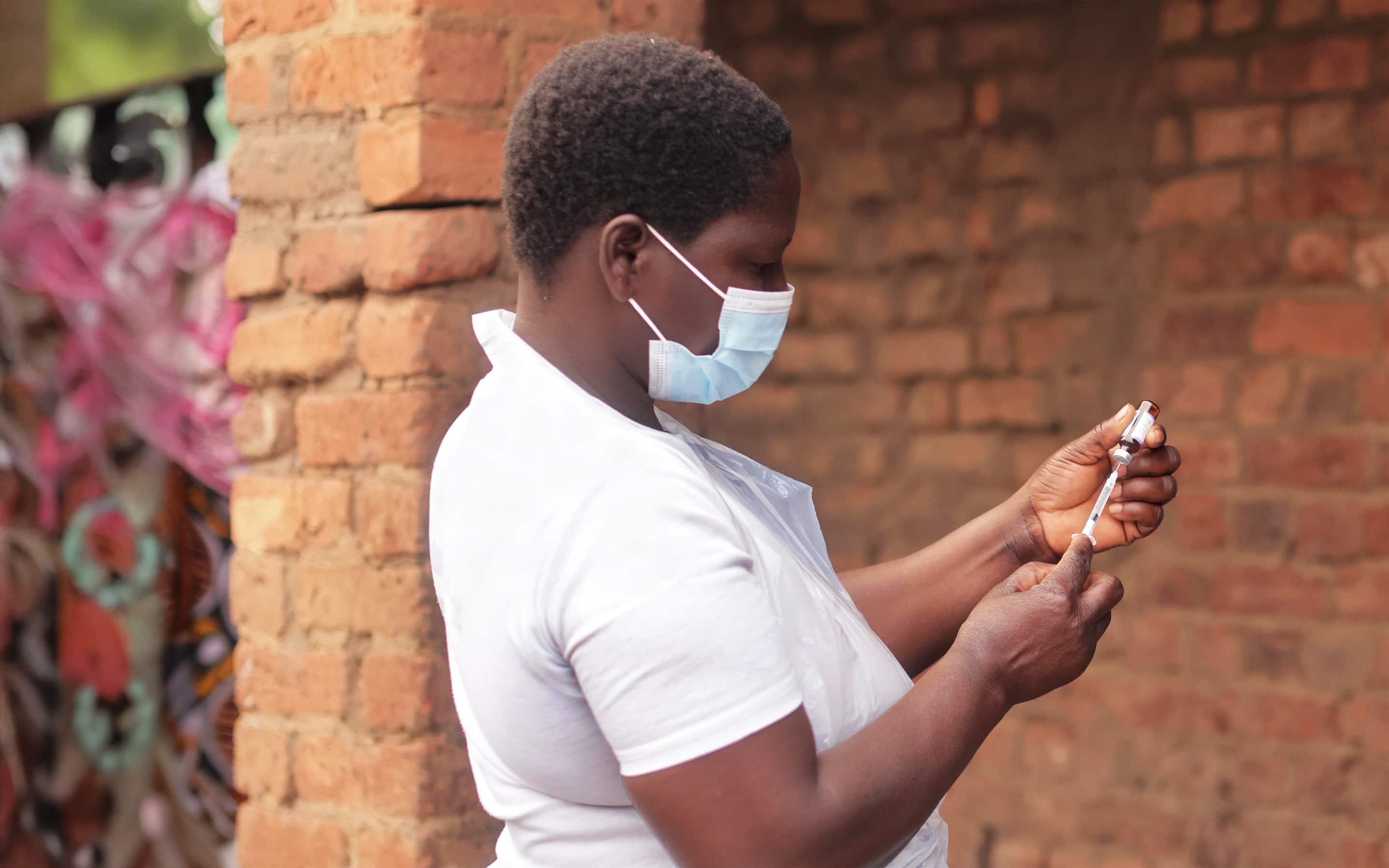Dr Sodzi Sodzi-Tettey, a medical doctor by training and a public health specialist, is the Chief Executive Officer of Ghana’s National Vaccine Institute. The institute’s main goal is to coordinate and provide the ecosystem support needed to enable Ghana to manufacture vaccines locally. Linked to this is his desire to establish a robust National Vaccine Institute with at least 150 highly skilled professionals that will ensure that Ghana can develop and manufacture vaccines. This will enable the country to manage and contain any disease outbreaks.
 GIZ/Falco Seliger
GIZ/Falco Seliger
‘Protecting against future pandemics’
Sodzi Sodzi-Tettey heads the National Vaccine Institute of Ghana. In an interview with akzente, he explains why Africa has to produce more vaccines itself, why this is a good business case and how the collaboration with GIZ works.
Ghana is working on vaccine production for its own population but also for the whole of Africa. Why is that important?
The reason is very simple. Africa produces less than 1 per cent of the vaccines it uses. During the COVID-19 pandemic, we saw the detrimental consequences of this very clearly: we did not get the doses we needed because of vaccine nationalism and vulnerable global supply chains.
From that experience, we learned that Ghana – and the whole of Africa – has to become more independent and therefore more resilient in this respect. This is why the Africa Centres for Disease Control and Prevention formulated the goal of going from 1 per cent to 60 per cent production in Africa by 2040. It’s a health security issue, and Ghana supports that goal.
Why is this relevant for both countries – Ghana and Germany – and how do both sides benefit?
It’s an important precautionary measure to prevent or deal with the next pandemic. We all know it’s not about if that will happen but when. The better we are prepared, the easier it will be to deal with it. Viruses do not stop at national or even continental borders. It’s therefore also in the interest of Germany that we strengthen our local manufacturing capacity and build the necessary institutions, as this contributes to global health security. Plus, it’s an opportunity for both sides to learn from each other.

‘With its commitment, GIZ is one of the most important contributors to our work.’
Where are you in this process?
In 2023, Ghana founded the National Vaccine Institute – NVI –, which I have the honour to lead and build up. Our mandate is threefold: to establish the institutional arrangements for research and to develop and manufacture vaccines and sera in Ghana. We are progressing in all three fields.
As far as manufacturing is concerned, we have, from the beginning, adopted a public–private partnership scheme. Together with two pharmaceutical manufacturers in Ghana – Atlantic Lifesciences Ltd. and DEK Vaccines Ltd. –, we want to roll out vaccine manufacturing. We have not produced any vaccines yet, but work is already underway to produce a tetanus–diphtheria vaccine through a formulation fill and finish process. More are to come, like the hepatitis B vaccine, and we are also looking at an oral cholera vaccine. I might also add that Atlantic Lifesciences Ltd. has just been granted market authorisation by the Ghana Food and Drugs Authority for the commercial production of snake venom antiserum. These are exciting times in Ghana and in Africa.
What role could the private sector of industrialised countries play here?
It’s crucial for us to get private investors from the Global North. For example, Atlantic Lifesciences – one of our partners – has already invested millions in the construction of a plant that can produce a snake venom antiserum. Given the growing African population and the great need for vaccines, the potential is enormous. Therefore, Atlantic Lifesciences and the other vaccine manufacturer – DEK Vaccines – are looking for investors that can help them to build specific plants for vaccines.
We are also talking to governments to provide market guarantees for the vaccines to be produced. That means, in short: this is a good time for private sector partners from industrialised countries, local companies and governments to work more closely together through direct investments, tech transfer arrangements, and strengthened National Regulatory Authorities.
Building up vaccine production in Ghana
The vision of President John Dramani Mahama’s government is to establish Ghana as a pharmaceutical manufacturing hub in West Africa and beyond. GIZ has been supporting the country’s plan to be more self-sufficient in pharmaceutical and vaccine manufacturing since 2021. On behalf of the German Development Ministry (BMZ) and the European Union, GIZ implements the PharmaVax Ghana programme as part of the Team Europe Initiative on Manufacturing and Access to Vaccines, Medicines and Health Technologies in Africa (MAV+), under which Europe supports African partners to boost local production. The programme works with Ghanaian and international partners such as public authorities, the private sector, and research and training institutes. Among other actions, GIZ supports the National Vaccine Institute by assisting it in strengthening its capacities to coordinate and supervise vaccine research, development and manufacturing. That involves organisational development, staff training, technical advice and logistical support.
How do you collaborate with GIZ?
GIZ is currently our main provider of technical support in Ghana as far as the National Vaccine Institute is concerned. GIZ is implementing a programme called PharmaVax Ghana, which is co-funded by the European Union and the German Federal Government. GIZ and NVI are collaborating closely because PharmaVax Ghana is working on creating a favourable ecosystem for pharmaceutical and vaccine manufacturing in the country. The goals of PharmaVax Ghana and NVI are perfectly aligned. With this commitment, GIZ is one of the most important contributors to our work.
You have a mandate for four years. What do you hope to achieve during that time?
There are four results I am driving for. By the time I leave, I would like to have built the institutional capacity to do research and development of vaccines. This will ensure that if there is any outbreak, we have the technical know-how and the resources to intervene positively for the country. I also hope that we will clearly establish adequate standards for good manufacturing practices. And I would wish to see three or four vaccines being pushed on the market by then.
Finally, I would like to see the NVI being more proactive in human capacity development especially in biomanufacturing. With the support we are currently receiving from H.E. President John Dramani Mahama and Hon. Kwabena Mintah Akandoh, the Health Minister, coupled with the ongoing partnership with our EU and German colleagues, and the broader coalition of partners we seek to build, we are very hopeful. It’s good for Ghana, for Africa and beyond.